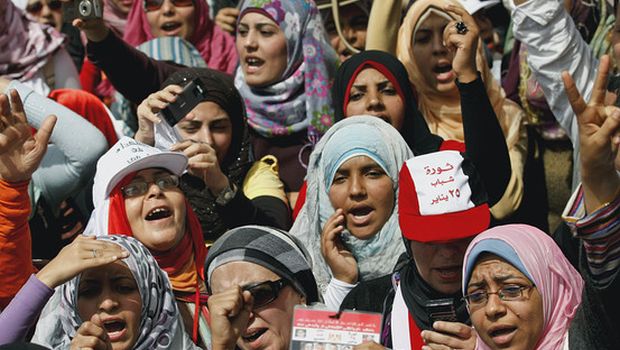Arab women did not generally expect the wave that hit Arab Spring countries to be as large as it was. Barring a few exceptions in a handful of regions and cities within these countries, women were generally surprised by what took place, but nevertheless ultimately engaged in the street demonstrations and sit-ins. In other words, women who went down to these public spaces did become participants in what was going on, often giving speeches at gatherings and interacting with youth and other participants in the squares.
When the calls for demonstrations were launched at the start of the Arab Spring, in many countries it was the youth that first took up this call. Yet the situation in south Yemen was different. There it was the women who actually came out before the men in search of a political future and greater safety across society.
After a massive wave of demonstrators took to the streets and began a sit-in in a main square, the role of women became more prominent. This came about through their role in providing sustenance for participants in the sit-ins, whether through the provision of food, tents, volunteer assistance in emergency operations, caring for the injured, or otherwise. In many cities of the Arab Spring countries women took on more of a “supporting role” than a central one. This did not remain the case for long, however, as women started giving lectures at sit-ins, encouraging protesters, and boosting morale.
Arab women generally were not prepared for what happened during the Arab Spring. We can perhaps say that they were surprised by the revolutions. But we should also note that, with regard to Yemen, the situation in the south was different from that of the north. In the south, women came out first. It was only after this point that a lot of the men followed suit. Yet if you were to take a look at what tended to happen across all Arab Spring countries, you will find that men came out first, and then women subsequently followed. This is what happened in Tunisia, Egypt, Libya and Syria.
Most of the movements that formed in the Arab Spring countries, especially after 2005 and particularly in Egypt, tended to be dominated by men, not women—despite women being the most oppressed group in these countries. The reluctance of women to participate in a broad scale early on may return to the notion that they were not fully aware during this early defining period just where these revolutions would lead and what they entailed. Because of this, revolutionary momentum is much more evident in men, as opposed to women, during the period just before the start of the Arab Spring.
However, with the broadening of the protests and their transformation into battles over the fates of ruling regimes, women began coming out and participating in marches and demonstrations, raising slogans alongside the men. Whoever followed these events cannot forget the strong participation of women and their help in the squares, whether in setting up tents, delivering speeches, or establishing numerous alliances—and this was the case both in south and north Yemen.
The problem today is that everyone is frustrated because more than three years have passed since the start of the Arab Spring revolutions. Nonetheless, women are still, to some extent, trying to achieve the goals they originally came out for. In any case, today it is safe to say that everyone suffers from frustration—both women and men—because of the chaos and futility of the situation in Yemen. These are issues you pay for directly through a state of frustration. The truth is that there is no state. And so, today, we still are, as we were years ago, divided into regions, and still do not know what the status of these territories will be. The situation in each territory has become chaotic and random.
And so, lacking a regime, and in the absence of the state and the rule of law, women in Yemen are suffering once again. The women in other Arab Spring countries, moreover, still suffer and have not achieved what they aspired to, whether in terms of representation in the parliament or the judiciary, or appointments in the government or presidential elections. Even in Egypt we have not heard about a female presidential candidate.
The counterpoint to this article can be read here.
